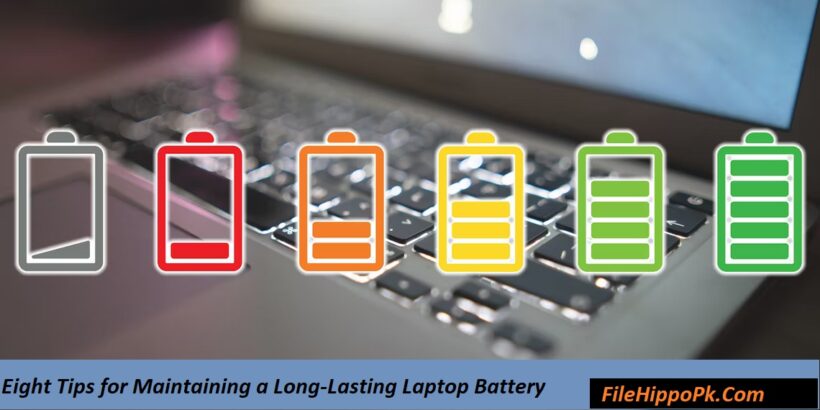Lithium-ion, or Li-ion, batteries power the majority of laptops today. These batteries have a full charge capability while they are brand-new, but with time, they gradually lose this ability. These pointers will assist you in taking the necessary care of them, which is essential to maintaining their capacity to retain the highest charge for the longest amount of time.
1. Avoid charging your laptop overnight.
Although it’s often accepted that charging your laptop overnight on occasion is safe, you should only do this if the charger has an automated shutdown option that will cut off the charge as soon as the battery reaches its maximum capacity. If you use a charger without this function, the battery can get constant power, which might weaken it and shorten its life.
Even with a legitimate charger that has an automated shutdown mechanism, charging batteries overnight on a regular basis might hasten their deterioration. Thus, you shouldn’t develop a habit of it. Remember that the charger has the potential to overheat and catch fire. Therefore, it’s better to avoid charging your laptop overnight unless absolutely required.
2. Use a well-ventilated area to charge your laptop.

When a laptop battery is being charged, heat is produced. If this heat is allowed to build up in a warm, stuffy space, the battery may overheat. The longevity of the battery may be negatively impacted by this overheating. Charge your laptop in a space that is open and has enough ventilation to allow heat to escape in order to avoid this. It may also be tipped slightly or set on a stand.
In addition to the possibility of overheating when charging, a number of other circumstances, such as leaving the laptop in a hot car on a summer afternoon or leaving it in direct sunlight, can also lead to battery overheating and possible damage. Moreover, rushing to cool down your laptop will reduce its longevity.
3. Sustain Charge at 20–80% of Total
It’s normal to charge your laptop all the way to 100% capacity in order to extend its battery life. Furthermore, a lot of us keep using our laptops even after the battery level drops to less than 10% or until the device shuts down entirely. Actually, using the laptop battery at a low charge level and fully charging it might reduce its life.
For best battery health, most manufacturers recommend keeping the charge level between 20 and 80 percent. Thus, when the charge level hits 80%, you should detach the charger, and when it falls to 20%, you should reconnect it. You shouldn’t charge the laptop to 100% unless absolutely necessary, such on lengthy trips or in meetings.
4. Set the charge level threshold to 80%

A smart charging function that, when used, stops the charging process after the battery reaches the 80 percent charge level is found on a lot of contemporary laptops. The term “smart charging,” “optimised charging,” or a similar term may refer to this functionality, depending on the manufacturer.
Your device’s setup will determine how to enable it. The Surface app may be used to change the threshold if you own a Surface laptop. Setting the charging threshold for laptops may be done via the Lenovo Vantage companion app, the MyAsus app for Asus laptops, and the MSI Dragon Centre programme for MSI laptops.
5. Avoid Utilising Incompatible Chargers
Your charging adapter’s wattage should correspond to the specifications of your laptop battery. Selecting a low-wattage charger might result in the battery not drawing enough current, which could slow down charging and shorten its lifespan. Additionally, this can lead to an overheated low-wattage charger, which could harm the laptop battery.
It can also be dangerous to use a third-party charger that lacks essential features like an automated shutdown mechanism that stops charging when the battery is full. Use only authentic chargers, then. Replace the laptop charger that came with it with an original one from the manufacturer if it breaks down.
6. Minimise Laptop Use While Charging
It is generally accepted that using a laptop while plugged in is safe since the laptop uses the surplus power to charge the battery while drawing power from the AC adapter. Many people do not realise, nevertheless, that using the laptop excessively might lead to overheating. The longevity of the battery may be impacted by this extreme heat.
Thus, you shouldn’t use your laptop when plugged in if it feels hot. Additionally, when working on lengthy chores that tax the system and increase heat, unplug your laptop from the wall. Removing the battery while the laptop is plugged into an AC outlet will prolong the life of the battery if your device has one.
7. Minimise Your Laptop’s Battery Usage
Every battery has a certain amount of charge cycles before it starts to lose efficiency and store less charge. Consequently, you will approach the maximum cycle barrier sooner if you use your battery charge more frequently and harshly. Reduce the amount of battery power your laptop uses by optimising its settings.
Keep the brightness down, shut off background apps, put on power-saving mode, avoid running resource-intensive programmes too often, keep your laptop in a cool place, and utilise aeroplane mode more frequently to maximise battery life and lengthen the time between charges.
8. Avoid always having your laptop plugged in.
One frequent way to deal with power outages is to keep your laptop plugged in until it achieves full charge. While useful, keeping the battery charged to its greatest capacity all the time might be harmful. Microsoft suggests utilising the smart charging option and discourages maintaining the charge level at 100% all the time.
The best course of action is to fully charge your laptop, unplug it, use it for work, and then turn it on for charging when the battery is down to 20%.
The aforementioned advice is essential to maintaining the longevity of your laptop battery. By adhering to them, you can increase its longevity and possibly prevent needless replacement. Replace your laptop batteries right away if you observe a noticeable reduction in the amount of time it takes to fully charge it. This might be a warning of a probable loss of capacity.
